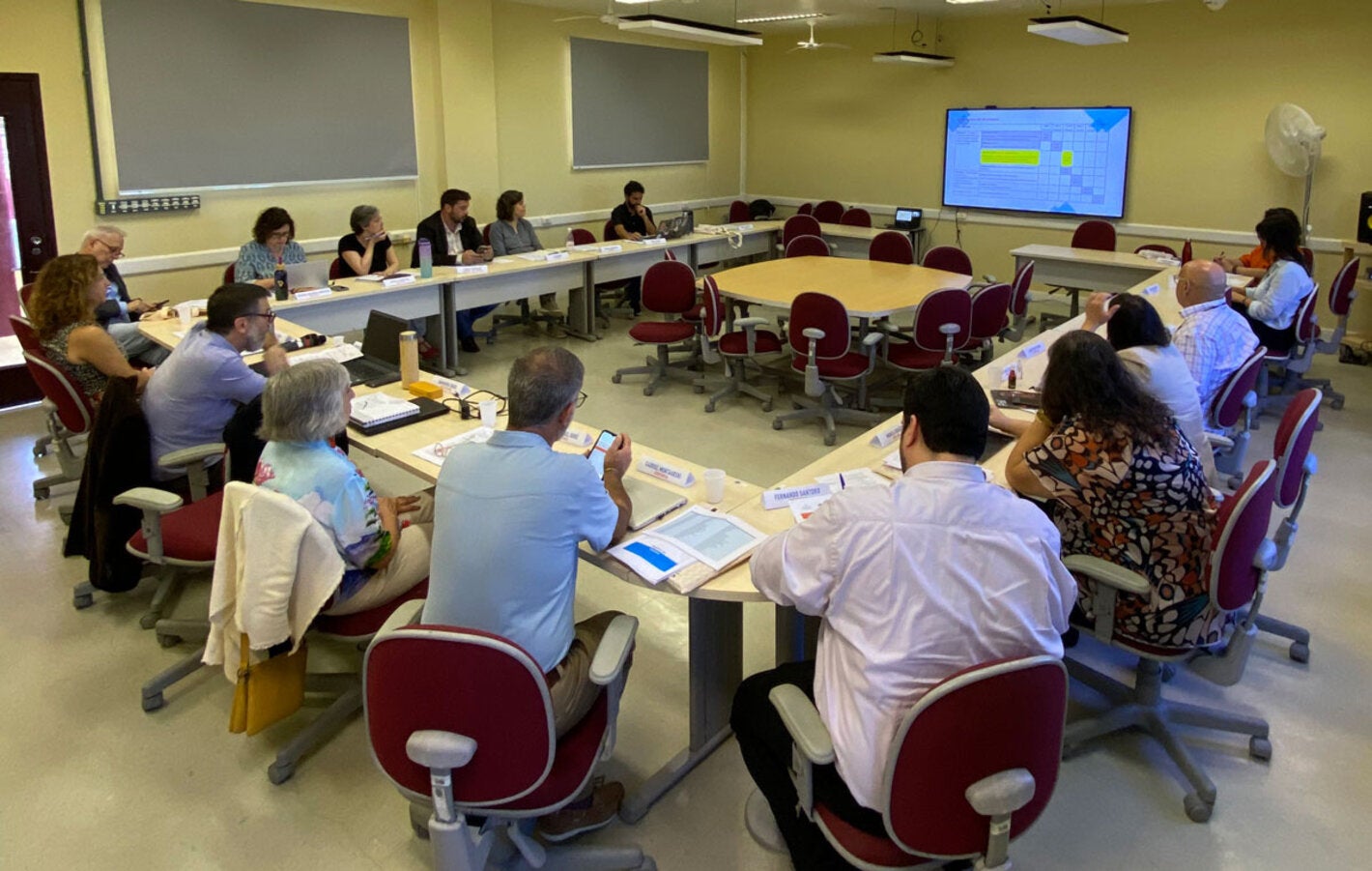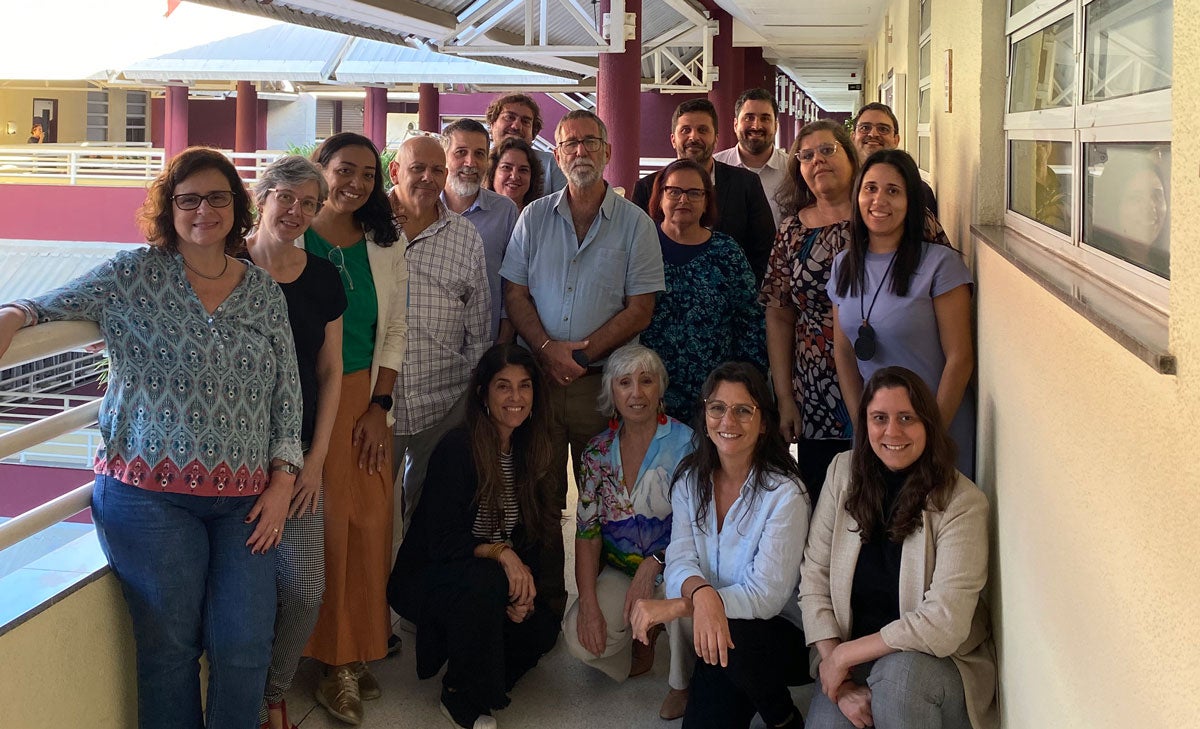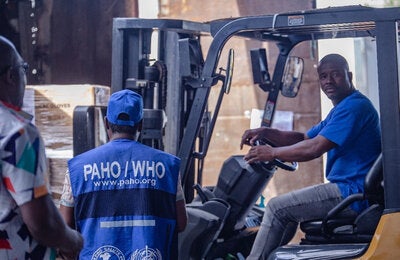
Rio de Janeiro, Brazil, June 14, 2024 (PAHO) - Experts from the Pan American Health Organization (PAHO) participated in a two-day workshop at the Joaquim Venâncio Polytechnic School of Health (EPSJV in Portuguese), located on the grounds of the Oswaldo Cruz Foundation (Fiocruz) in Rio de Janeiro, Brazil. The aim was to discuss strategies to increase access to courses offered by PAHO's Virtual Campus for Public Health (VCPH), for health technicians.
During the meeting, the EPSJV Collaborating Center team in conjunction with the VCPH, presented the results of a research project which was initiated in January 2024. The analysis covered the profile of technicians registered as users on the VCPH, their occupations, the most demanded courses, and various categories aimed at evaluating the courses' relevance to technicians.
María Isabel Duré, an international consultant for the VCPH and PAHO's Human Resources for Health Unit, established the framework for the workshop by referencing the document “Educational Approach of the VCPH”. This document emphasizes virtual platforms as environments for collaborative exchange, learning, continuous health education, and ongoing engagement with real-world scenarios. She also highlighted the development of the Learning Pathways in Primary Health Care (PHC), which the Virtual Campus initiated at the request of PAHO Director, Dr. Jarbas Barbosa.
"The learning pathways aim to define the professional roles of various health workers according to their field of work, offering them training paths tailored to their needs, and prioritizing training, by reducing the dispersion of proposals," explained María Isabel Duré.
The workshop activities were part of a project funded by the Spanish Agency for International Development Cooperation (AECID in Spanish), aimed at enhancing the capacity of health technicians in remote and underserved areas of the Americas, within the post-COVID-19 pandemic framework.
Gabriel Muntaabski, a consultant at EPSJV and coordinator of the research study, expressed positive feedback about the meeting, emphasizing the high level of participation from all technical cadres. "These were two days of real networking, where colleagues made constructive contributions that generated new ways to strengthen our research. These contributions will facilitate growth in underexplored areas regarding technical occupations in Latin America, particularly identifying traditionally invisible technical professions that are increasingly utilizing the Virtual Campus for their training," he said.
The workshop also included the presentation of a dashboard with consolidated data from about 486,000 enrollments of technical users along with information on the 20 most popular courses on the Virtual Campus in the post pandemic period. Fernando Santoro, the researcher who organized this section, facilitated a discussion on the data's potential implications, leading to the generation of new research proposals and course development initiatives.
"The Virtual Campus has an incredible database, which provides country-specific information that allows for tailored health management policies. This information is invaluable for expanding education," said Anamaria Corbo, director of EPSJV. She noted, "For example, we found a high percentage of ambulance drivers taking Virtual Campus courses. This highlights the need to address the educational demands of often overlooked professional categories."
The director of JVPSH emphasized that the Virtual Campus is critical in responding to climate emergencies. Citing the flood catastrophe in Rio Grande do Sul, Brazil, he remarked, "National health systems are not prepared to respond to extreme weather events. Being able to quickly organize courses to address the countries specific demands is essential. The Campus can do so, aligning with the paradigm of continuous education in health".
The working days, held on June 3 and 4, 2024, brought together a diverse group of participants, including Ana Paula Cavalcante from PAHO's Human Resources Unit for Health, Monica Duraes, PAHO's Brazil Representative, Mario Dal Poz and other members of the Institute of Social Medicine at the State University of Rio de Janeiro (UERJ), Sebastián Tobar from the Center for International Health Relations (CRIS/Fiocruz) of the EPSJV's Observatory of Health Technicians, and the international cooperation team of the EPSJV.
These workshop activities are part of a broader project funded by SAIDC, aimed at enhancing the capacity of health technicians in remote and underserved areas in the post COVID-19 context.
The two-day event concluded a series of meetings, which included the webinar "Profile and Educational Trajectories of Health Technicians Enrolled in CVPH/PAHO Courses" held on April 16 [see it here] and the virtual session "Analysis and Discussion of Critical Points Observed by the Research Team in the Categorization of Technical Occupations," which took place on May 17th.
Photographer: Larissa Guedes (RETS/Fiocruz)




